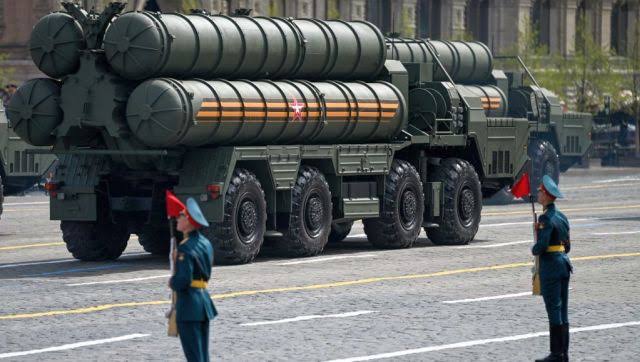America’s CAATSA Gimmicks : Roar Ends In Whimper

CAATSA, is a USA law enacted in 2017. As per this the United States is able to threaten smaller countries that carry out ‘significant transactions with Iran, North Korea and Russia’. India’s purchase of the S-400 defence system from Russia called the American bluff. India just ignored the CAATSA and USA had to backtrack
India’s Independent foreign policy scored a big win on Friday when the US was left with no option but to backtrack on its CAATSA threat to India. When India refused to react to the American domestic law and just went ahead with its defence purchases from Russia, the red faced US Administration didn’t know how to save face.
They began whimpering and begging India to make a formal request for CAATSA Waiver. India was not even amused. Now finally the USA House of Representatives have passed an amendment that “approves” a waiver to India against the punitive CAATSA sanctions for its purchase of the S-400 missile defence system from Russia.
What Great Gesture. Should Indian Parliament pass a resolution giving a PARDON to the US House of Representative for having enacted the CAATSA in first place !!!!
The amendment, authored and introduced very cleverly by an Indian-American Congressman Ro Khanna, received an astounding majority of 330 to 99 and now awaits passage in the Senate.
“The United States must stand with India in the face of escalating aggression from China. As Vice Chair of the India Caucus, I have been working to strengthen the partnership between our countries and ensure that India can defend itself along the Indian Chinese border,” said Khanna, the US representative from California’s 17th congressional district, as USA was left with no other option to save its face.
He added that the waiver of CAATSA sanctions is in the best interests of United States and the United States-India defence partnership. What he has not learnt is that only basis of friendship between the two countries EQUALITY.
The issue became a Gordian knot for the USA Administration staring from their President downwards. India since October 2018 when New Delhi signed a $500 billion deal with Russia to buy five units of the S-400 air defence missile systems — known to be Russia’s most advanced long-range surface-to-air weapon — just ignored all the tantrums and warnings from the then President Donald Trump and his administration that such a deal would invited US sanctions.
Then started diplomatic pressures, threats and cajoling. Next started arriving the American lawmakers with their debates, pleas etc. Many extended their “support to INDIA”by saying the nation should not be sanctioned — as if they were not aware of the results of 1998 sanctions. India rebuffed all their actions. In March, top Republican Senator Ted Cruz had said, “There are reports that the Biden administration is contemplating imposing CAATSA sanctions against India, the largest democracy on Earth, a decision that I think would be extraordinarily foolhardy.”
In April 2021, Republican Senator Todd Young, a member of the Senate Foreign Relations Committee, wrote that if the Joe Biden administration imposes sanctions on India, it would undermine their relations and also affect the Quadrilateral Security Dialogue (QUAD), the strategic security grouping of the US, Japan, Australia, and India.
First off, CAATSA, is just a piece of legislation for Americans to threaten weak nations. It is the Countering America’s Adversaries through Sanctions Act. It was signed into law on 2 August 2017, by then President Donald Trump. CAATSA was passed by the Senate on 27 July 2017.
Under this law, the American government can impose sanctions on any country that has “significant transactions with Iran, North Korea or Russia”. The law entails economic and financial penalties for any nation that transacts with Russia on arms. It is a domestic law of USA with no jurisdiction outside its boundaries. So countries like India have denied all permission to this law to operate against India.
Section 231 of the law has outlined 39 Russian entities that are on the list, which invites sanctions. They include major defence firms like Rosoboronexport, Sukhoi Aviation, Russian Aircraft Corporation MiG, as well as Almaz-Antey Air and Space Defence Corporation JSC, who have made the S-400 system. India has just gone ahead with its defence purchases from Russia.
The idea behind CAATSA was to “ punish” Russia for the Crimean annexation in 2014 and its alleged role in the 2016 US presidential election. Finally the Ukraine conflict has shown the hollowness of such sanctions against Russia. In the bargain it is the USA and its allies that are getting hurt.
In December 2020, the United States announced that it was imposing sanctions on NATO-ally Turkey for its purchase of Russia’s S-400 missile defence system.
Sanctions were imposed on Turkey’s main defence procurement agency the Presidency of Defence Industries (SSB) for “knowingly engaging in a significant transaction with Rosoboronexport (ROE), Russia’s main arms export entity” the office of the US State Department spokesperson said in a statement.
The sanctions on Turkey raised demands that Washington should impose similar punitive measures on India. Then the USA realized its folly and developed cold feet.
In 2021, the US levied CAATSA sanctions on China’s Equipment Development Department (EDD) of China’s Ministry of Defence for its purchase of 10 SU-35 Russian combat aircraft in 2017 and S-400 equipment in 2018. All proved to be nonsensical.
On the possibility of being sanctioned for its S-400 deal with Russia, the Ministry of External Affairs (MEA) has reiterated that New Delhi follows an independent foreign policy and its defence acquisitions are guided by its national security interests.
“India and the US have a comprehensive global strategic partnership and India has a special and privileged strategic partnership with Russia. We also pursue an independent foreign policy. This applies to our defence acquisition and supplies which are guided by our national security interests,” MEA spokesperson Arindam Bagchi had said in November 2021 when asked to comment on India’s position on the matter.



